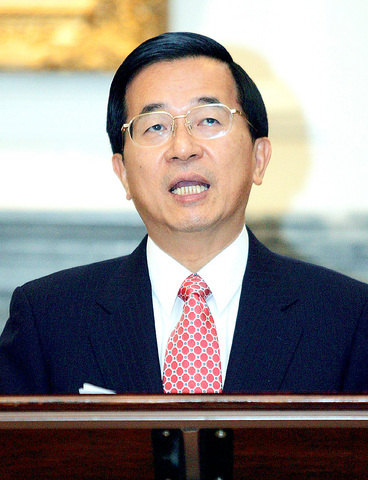The 10-point consensus reached between the Chinese Nationalist Party (KMT) and the Chinese Communist Party (CCP) is "meaningless" without consensus within Taiwan between the ruling and opposition parties, President Chen Shui-bian (陳水扁) said yesterday.
In his first public remarks on the agreement between KMT Vice Chairman Chiang Pin-kun (江丙坤) and CCP officials on Wednesday to expand trade, travel and commercial ties, Chen said the KMT should have consulted with the government first.
"We have our own country, our own government. To negotiate with the other side on such sensitive, serious issues -- not only did they not have permission or authorization from the government, they had not consulted with the government either," he said as he received a delegation of overseas Chinese from Osaka, Japan.

PHOTO: AFP
"If there is no consensus with the government, and if there is no internal consensus between political parties, what meaning is there in their own wishful thinking in seeking this so-called `KMT-CCP' consensus?" Chen said.
Cross-strait relations were an issue central to Taiwan's existence, Chen said, and the issue not only has direct baring on national security but also influences the basic rights and wellbeing of the 23 million people of Taiwan.
"While different parties may hold different views and stances with regard to cross-strait issues, when it comes to facing the outside world, there ought only be one Taiwanese national interest, and only one common voice that can represent the public's volition as a whole and safeguard the overall interests of Taiwan," Chen said.
Reiterating that the biggest difference between the two sides of the Taiwan Strait lay not in their separate governments, but in the disparity between their political systems and lifestyles, he said that cross-strait development "would be one of competition -- one of democracy versus communism and peace versus non-peace."
"A divided house cannot stand," Chen said, adding that "cross-strait policy can't last long, and can't withstand the kinds of test that occur when everyone goes and does their own way on the issues."
"Only by uniting and through a united Taiwan is there a way out," he said.
Achieving cross-strait breakthroughs would be a test not only of the wisdom of the leaders on both sides of the Strait but also of the leaders of Taiwan's governing and opposition parties, he said.
He said he hoped that the ruling and opposition parties would take the attitude of "putting Taiwan first" in pursuing permanent cross-strait peace.
also see stories
Premier slams KMT delegation
Stop painting the delegation's efforts in red, KMT says

Taiwan yesterday denied Chinese allegations that its military was behind a cyberattack on a technology company in Guangzhou, after city authorities issued warrants for 20 suspects. The Guangzhou Municipal Public Security Bureau earlier yesterday issued warrants for 20 people it identified as members of the Information, Communications and Electronic Force Command (ICEFCOM). The bureau alleged they were behind a May 20 cyberattack targeting the backend system of a self-service facility at the company. “ICEFCOM, under Taiwan’s ruling Democratic Progressive Party, directed the illegal attack,” the warrant says. The bureau placed a bounty of 10,000 yuan (US$1,392) on each of the 20 people named in

The High Court yesterday found a New Taipei City woman guilty of charges related to helping Beijing secure surrender agreements from military service members. Lee Huei-hsin (李慧馨) was sentenced to six years and eight months in prison for breaching the National Security Act (國家安全法), making illegal compacts with government employees and bribery, the court said. The verdict is final. Lee, the manager of a temple in the city’s Lujhou District (蘆洲), was accused of arranging for eight service members to make surrender pledges to the Chinese People’s Liberation Army in exchange for money, the court said. The pledges, which required them to provide identification

Nine retired generals from Taiwan, Japan and the US have been invited to participate in a tabletop exercise hosted by the Taipei School of Economics and Political Science Foundation tomorrow and Wednesday that simulates a potential Chinese invasion of Taiwan in 2030, the foundation said yesterday. The five retired Taiwanese generals would include retired admiral Lee Hsi-min (李喜明), joined by retired US Navy admiral Michael Mullen and former chief of staff of the Japan Self-Defense Forces general Shigeru Iwasaki, it said. The simulation aims to offer strategic insights into regional security and peace in the Taiwan Strait, it added. Foundation chair Huang Huang-hsiung

’DISTORTION’: Beijing’s assertion that the US agreed with its position on Taiwan is a recurring tactic it uses to falsely reinforce its sovereignty claims, MOFA said The Ministry of Foreign Affairs (MOFA) yesterday said Chinese state media deliberately distorted Taiwan’s sovereign status, following reports that US President Donald Trump agreed to uphold the “one China” policy in a phone call with Chinese President Xi Jinping (習近平). During the more than one-hour-long call, Xi urged Trump to retreat from trade measures that roiled the global economy and cautioned him against threatening steps on Taiwan, a Chinese government summary of the call said. China’s official Xinhua news agency quoted Xi as saying that the US should handle the Taiwan issue cautiously and avoid the two countries being drawn into dangerous